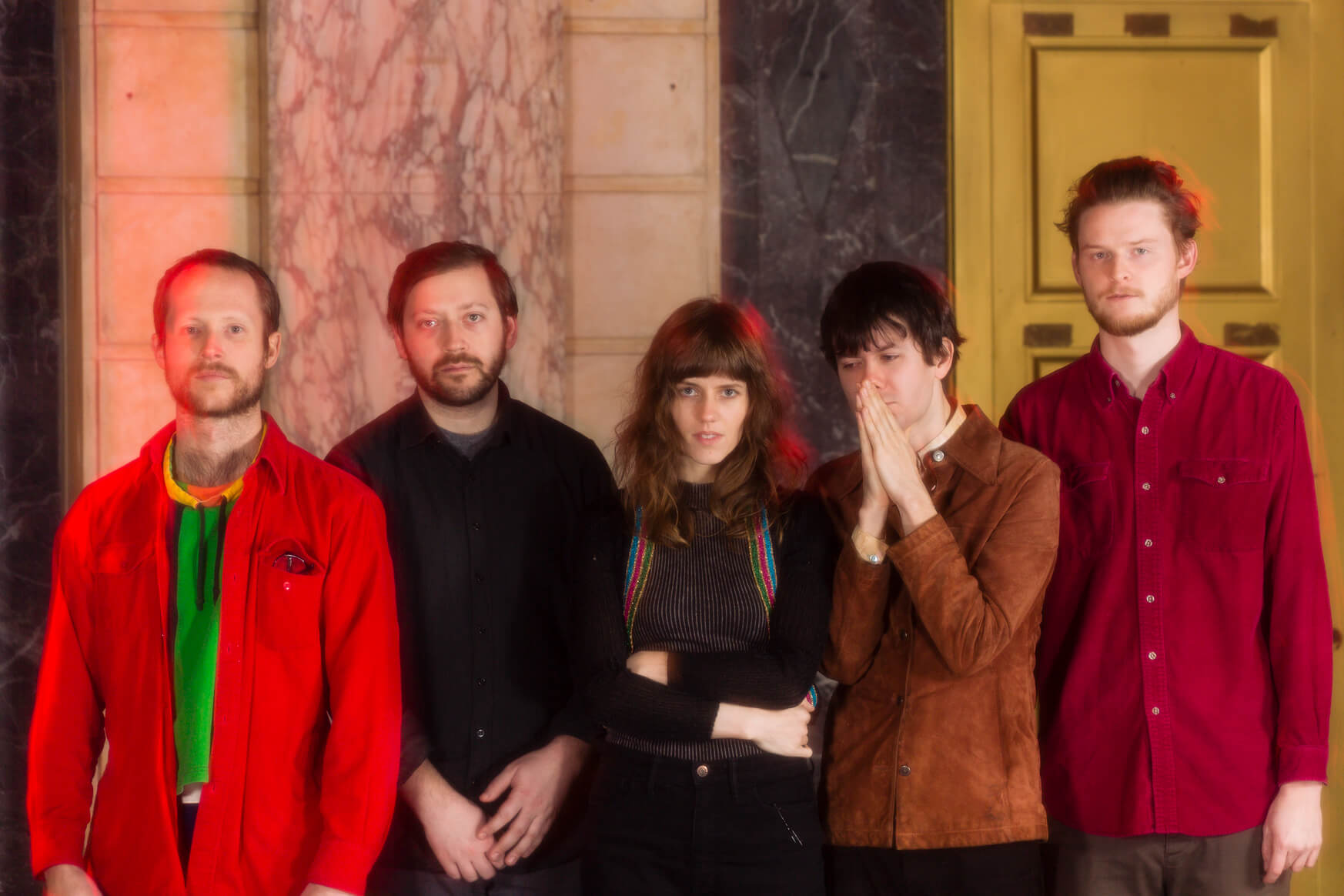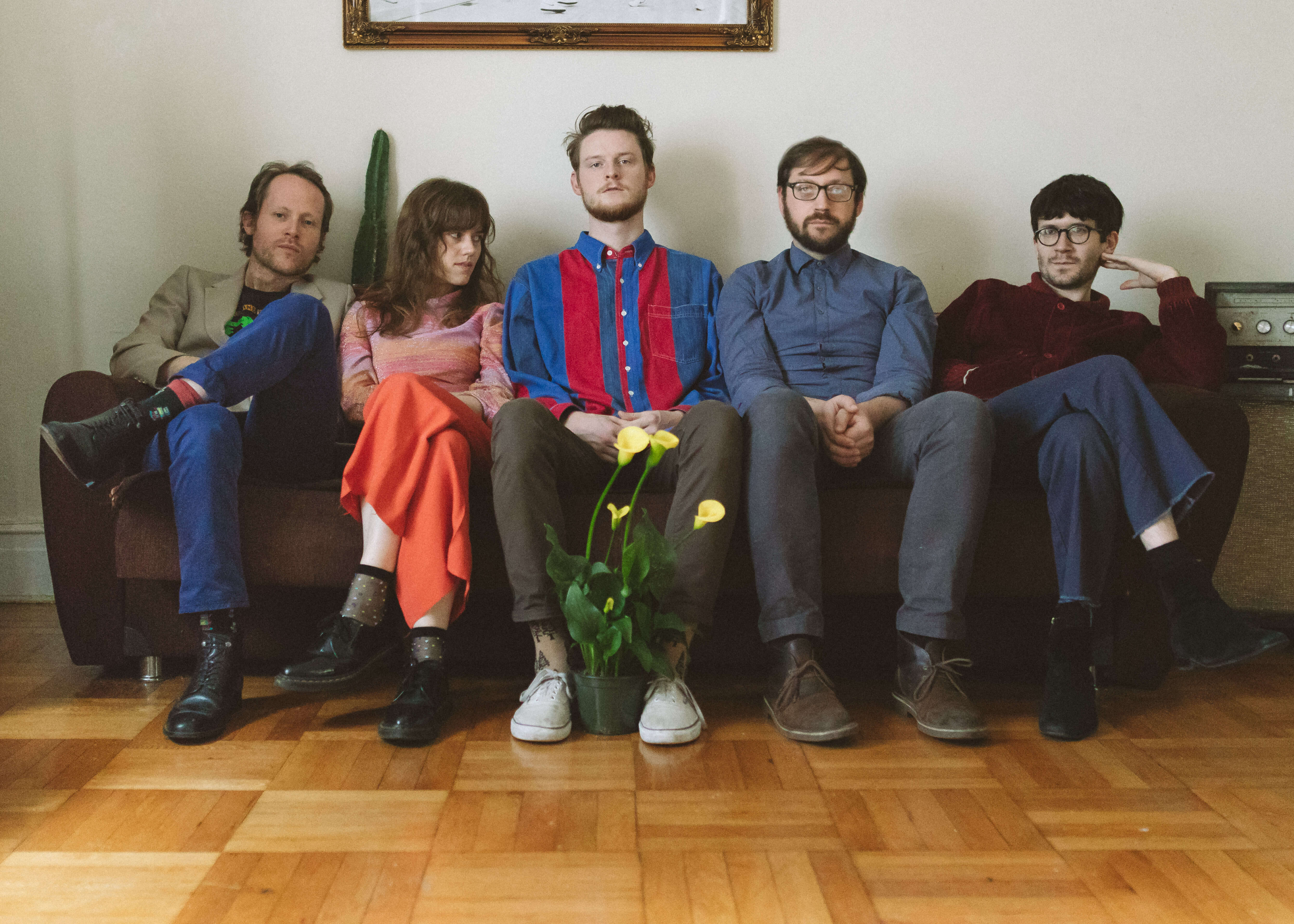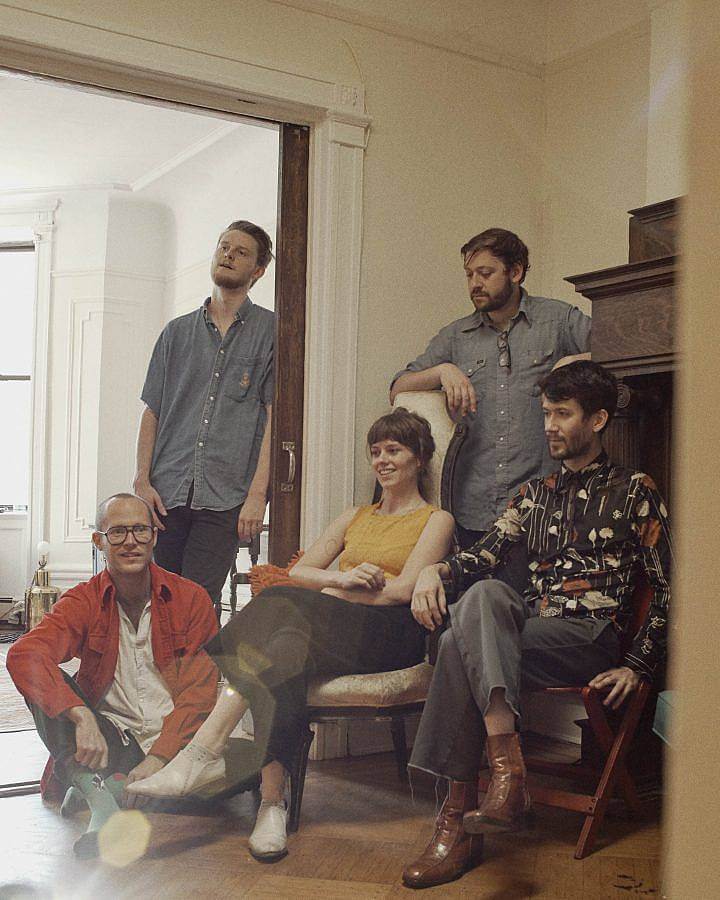Tell us a little bit about yourself and what you do.
My name is Gabriel Birnbaum, I’m the songwriter for the band – musically I try to find a meeting point between smooth 70s pop (Fleetwood Mac especially), the more challenging side of modern indie rock, and a lot of the Ethiopian music I play in a band called Debo Band, where I play saxophone. I think of the band as omnivorous, we incorporate everything we like, and much of it is surprising given our assigned genre of “indie”.
My bandmates are Katie Von Schleicher, a fantastic songwriter and solo artist in her own right, Nick Jost, a ridiculously good bassist who also plays in the metal band Baroness, and Sean Mullins, a drummer I lucked into finding when he was still working at Trader Joe’s, before everyone knew how great he was. We all live in the Flatbush/Ditmas Park area of Brooklyn.

What was it like recording your upcoming full length, Zion?
I spent a long time slowly writing and editing this album. I had a strong desire to make something coherent and unified in style, something more ambitious than just a collection of recent songs, and over the course of a couple of artist residencies I was lucky enough to have time to develop some rules for the process of writing it, and spend weeks of uninterrupted time writing. Some of the rules were simple: all the songs have a capo on the 8th fret. Some, like developing the lyrical style (which leans heavily on early Dr. John and 70s Bob Dylan but doesn’t exactly sound like either), were a little more complex. Having that free time where I did nothing but dream about music all day allowed me to have days of frustration, where I hated what I was writing, knew that it was bad, and instead of going off to get drunk or go to my job or watch TV like I would at home, I worked calmly through it and eventually broke through into new sounds each time. I’d never had that experience before.
Because of all that writing work out front, and because my band are all incredible musicians, the recording process was pretty smooth. We played 70-odd minutes of material live in 3 days, aside from vocals, at Figure 8 Recording in Brooklyn, with Sam Griffin Owens (AKA Sam Evian) getting fantastic sounds as our engineer. Then we headed back in for a few days to do some overdubs, and finished the tracking ourselves at home before heading back to mix with Eli Crews and master with Heba Khadry. There were some bumps along the way, but the band is very close personally as well as musically, and we work very well together. And, from those 72 min or so of material we carved out a 40 minute album that we feel proud of. This was something I’d wanted to do ever since the reissue of Songs: Ohia’s Magnolia Electric Co. record came out and I saw that the songs they cut were just as good as the rest. I thought, “damn, if I can get to the point where I’m cutting songs that I know are good, then maybe I can make a great record too.”
What is one of the bigger challenges you and/or other musicians are struggling with these days and how do you see it developing?
Well, not to get too into how the sausage is made, but: money. Everyone knows the industry has collapsed financially, and it’s really true. Streaming doesn’t add up nearly fast enough. The rates are around a half cent per stream, shared between the label and artist, and that’s if you’re lucky enough to have a label like us. Nothing has replaced physical sales. This means musicians all either need exhausting day jobs or the psychological toughness to live without the fun parts of life in late capitalism, like going out to events and bars and restaurants. Let’s not even get into worrying about if you’ll ever be able to own a house or have a family. We’re told subtly and constantly that not having money & not being able to make a living at music means that we’re not “real” musicians, and it’s not true. To everyone out there, trying hard: it’s not true. People don’t talk about this enough, and unsurprisingly there are also a lot of mental health problems in the music industry.
As far as how it develops – I wish I knew. I am curious what happens if Spotify never figures out a profitable model and all these bands who’ve been investing time and energy into racking up plays there suddenly find the platform is gone, along with all their streams. Bands are measured numerically in so many ways now, but what happens when those metrics disappear? We don’t own them.
I think the numerical measurability of popularity has caused bands to fixate on marketing, and while gamely putting in an effort to make people aware of your music is important, it won’t change your career unless the music is there. You can get it in front of anyone you want, but if it’s not good, it won’t catch. It also may be good and not catch. Sorry! The world isn’t fair.
How has living in Brooklyn affected your music?
Brooklyn in 2018 is insanely expensive, loud and filthy, always either too cold or too hot, full of unchecked malignant wealth and beautiful creative people who work their asses off. I love it and I hate it and I am constantly overwhelmed by it, but I’d be lying if I said struggling here hadn’t really knocked my corners off, as they say. I am grateful that I stuck it out here and met the people that I did. Few places are as dense with meaning as Brooklyn is to me now.
If you hadn’t become a musician, what do you think you’d be doing?
Pretty sure I would be on a similarly punishing path of becoming a professional writer! Some people just have the need.

What kinds of music/what musicians are influencing your work right now?
Playing in Debo Band and seeing amazing artists like Noura Mint Seymali and Seun Kuti on festival stages has had a big influence on my writing for Wilder Maker, specifically for Zion. Indie rock tends to be listen-only music, music you stand there and fold your arms and focus on, and the music I was writing 4 years or so ago especially was – inward, slow, melancholy. Watching the artists I mentioned and performing in Debo, I started thinking more about the other functions of music – music as party, music as joyful experience, music as movement. I thought – I could never play the music I’m writing now on a sunny festival stage at 2 pm. I thought – 2/3 of my personality is not reflected in my music. So I set out to make music that carried some of the rhythmic consistency and energy I was hearing, more joy and life and humor, more anger too. Less passive sadness. I still experience that and it’s still in my music, but it doesn’t dominate the way it used to, and hearing those bands is where I had that revelation.
What is something you love or hate about touring?
It sounds corny, but meeting new people and sharing music and spending time with them is really satisfying. We all spend so much time online counting our metrics of popularity and reach, and when you get out on the road you actually meet people face to face and, even if it’s far fewer than your Spotify plays per month or whatever your numerical fixation is, you get so much more from those interactions. They feel whole and not fractured. I also find that having your whole day and goals laid out each day from the instant you wake up, as an anxious person, is very soothing. You find the coffee, you make the drive, you load the gear, you find some food, you set up, you play, you go to sleep. Touring has also provided a hugely validating and vital escape from horrible service industry jobs for the last 16 years of my life.
What are you really excited about right now?
Honestly, I’m so excited for this record to be out, to hold it in my hands as an LP and send it off into the world. I worked so hard on it for so long, and I love it deeply though it’s almost time to let go. I’m so happy that Northern Spy decided to take a chance on me. I know tons of great records that are struggling to find labels, and in all my career as a songwriter I’ve never had a chance to work with one before last summer when we did that single with Saddle Creek. Even when things don’t go the way I hope, It feels so good to not be alone in it and to know that it’s really getting a chance to find its audience.
Can you share one of the best or worst reactions you have gotten as a result of your music?
People have said insanely flattering and nice things to me but naturally what comes to mind is this: I came up as a jazz saxophonist, and while I still play a lot of sax, I gradually shifted a lot of my energy over to guitar and songwriting, which I was initially not as good at. Once, when I had started playing my songs out, a friend asked me when i was going to stop it with my “acoustic bullshit” and get back to saxophone. Jokes on him, though, he joined the band later.
Your show at Sleeping Village is coming up July 19th. In your opinion, what makes for a good live show?
I think it’s different for each band – the answer has to come from some part of your identity as musicians. Some bands trash the stage and throw beers at the audience and it rules. If we did that it would be ridiculous. For us – the music is the focus, and the relationships and interactions between us musically are a huge part of the live show. There are spaces for improvisation and spaces where we lock in, and I think watching musicians with super longstanding relationships play together is really fun. We have a great time playing, which for me as an audience member is very enjoyable. I prefer bands having fun to bands being serious, again depending on the music. Also, though the record has plenty of overdubs and fun stuff, the backbone of it is really just us playing live, and I think it translates pretty powerfully to the live set for that reason.
